Are People Born Bad? Background, History, Definitions
- Lombroso’s criminal heredity theory (19th century) was replaced by the sociological approach.
- Lombroso estimated up to 40% of criminals to be innate (Sirgiovanni, 2017).
- Definition of criminals: a regression to a primitive stage of human evolution (Sirgiovanni, 2017).
- Criticism: insufficient evidence, poor methodologies, excessive determinism.
Notes: Innate criminal propensity was a popular criminological narrative back in the 19th century. Having identified the physiognomic characteristics that were widespread in arrested criminals, Lombroso developed his theory of criminal heredity. He defined potential criminals as a biological class of people with atavistic physical traits, claiming that being “bad” was genetically predetermined in about 40% of cases. Criticism, both methodological and ethical, has exposed the theory’s practical irrelevance.
- Sociological approaches: unfavorable conditions “create” a criminal.
- Hot spot mapping statistics: environmentally/socially vulnerable areas experience more crime events (Garnier et al., 2018).
- Crime – a healthy individual’s response to criminogenic social conditions.
- Hirschi’s social control theory: attachment to parents/having important things to lose (relationships, achievement) => higher law obedience (Costello & Laub, 2020).
Notes: Sociological theories that posit that people become “bad” because of specific exposures during their lifetime are more evidence-based compared to the opposite viewpoint. From hot spot mapping interventions, it is known that crime concentrates in poor and unstable areas, which implies links between social circumstances and becoming bad. From Hirschi’s theory, it follows that poor relationships with parents and having nothing to lose in terms of interpersonal relationships, social position, and success increase crime risks. These factors can change as a person grows, which implies that criminal propensity is not predetermined.
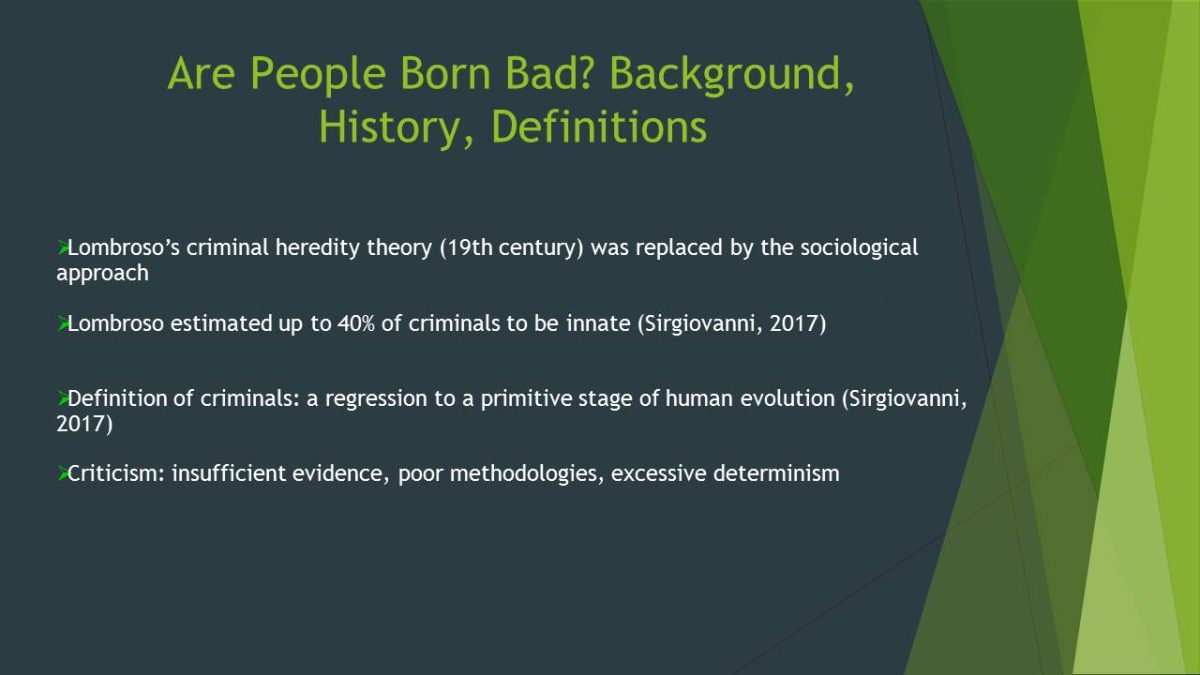
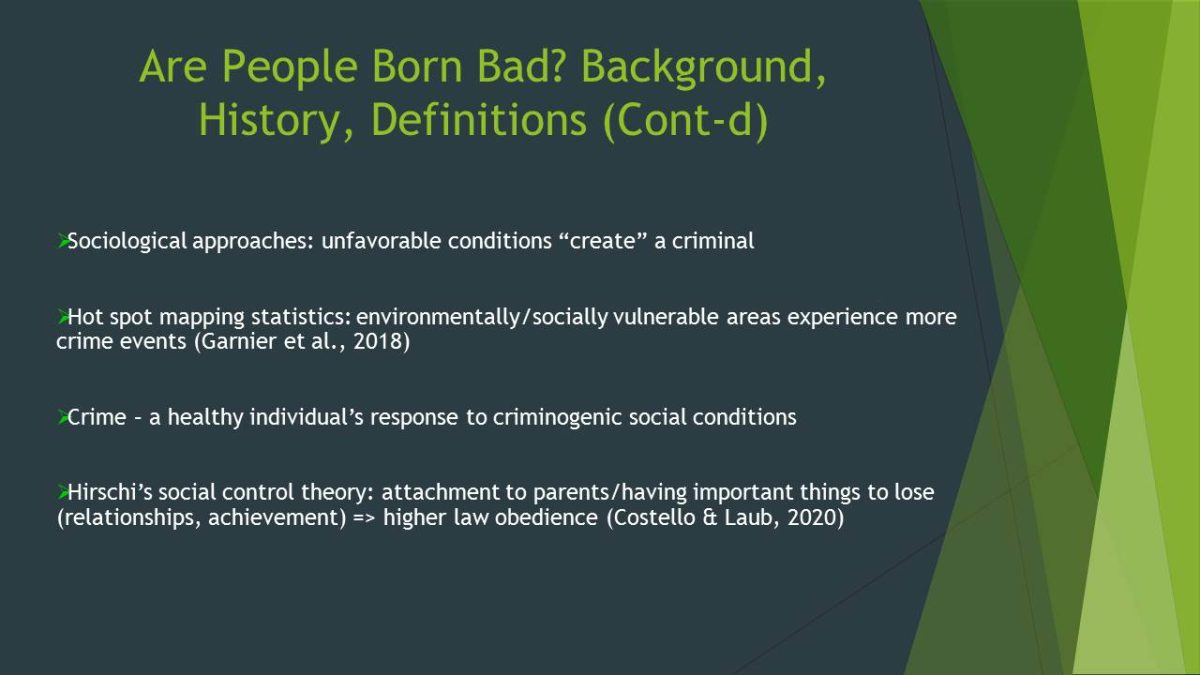
Anders Breivik – Motives, Criminal Justice Issues
- Author of “2083: A European Declaration of Independence”.
- Manifesto of far-right ideology and xenophobia.
- Demand for deportation of all Muslims from Europe.
- Self-perception as a “knight dedicated to eradicate Muslim immigration”.
- CJ issues: Radicalization, terrorism, law enforcement agencies’ responses to hate mongering.
Speaker notes: The 2011 Norway attacks, also referred as the 22/7 assaults in Norway, were two separate terrorist acts carried out by Anders Breivik, a Norwegian right-wing extremist. Breivik is the author of the book “2083: A European Declaration of Independence,” which is a collection of his ideas. The book details his violent far-right ideology and xenophobic worldview, which embraces a wide range of political notions like as cultural conservatism, right-wing populism, ultranationalism, and Islamophobia (Breivik, 2011).
It considers Islam to be a threat and advocates for the abolition of multiculturalism in order to preserve a Christian Europe (Breivik, 2011). He also asked Europeans to resurrect the Middle Ages’ historic crusades against Islam. The compendium calls for the restoration of patriarchy, claiming that it will restore European culture and blaming feminism for the decline of European society (Breivik, 2011).
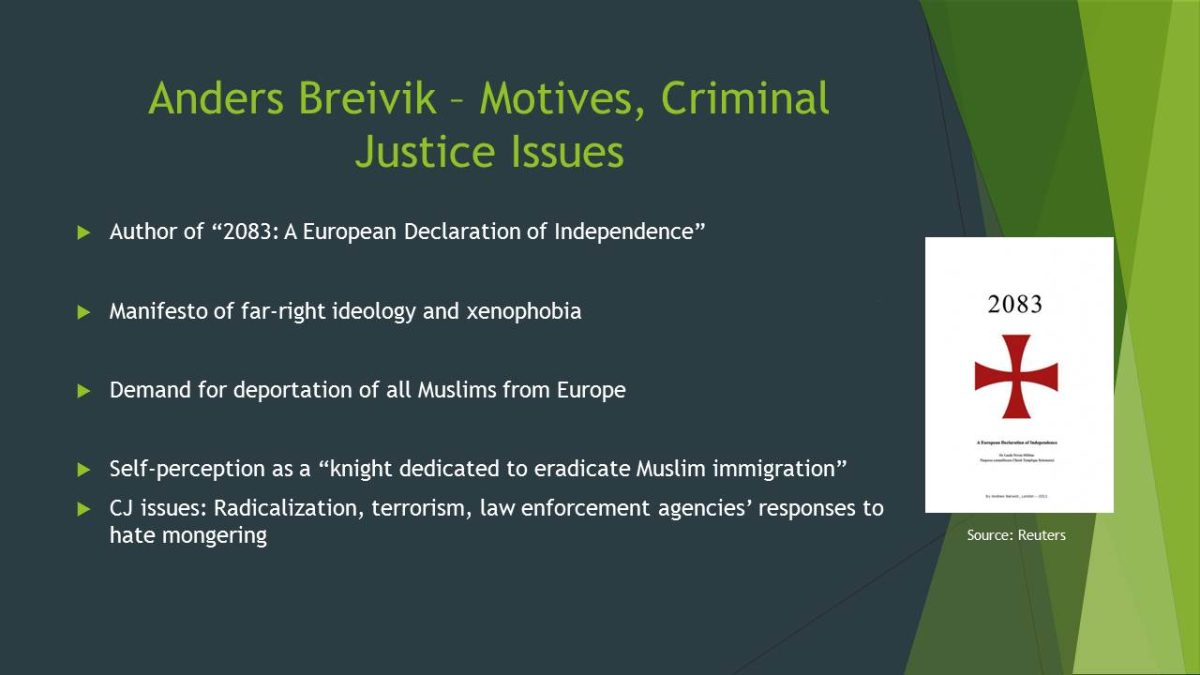
Is Anders Breivik an Inborn Criminal?
- Grew up in an expensive area in Oslo.
- Was a baby when his parents divorced.
- Mother was a depressive, self-destructive woman.
- Lead to constant social failures (The Guardian, 2015).
Speaker notes: Anders Breivik grew up in an expensive area in Oslo, however his home life was miserable from the start. He was still a baby when his parents got divorced and his mother was a depressive, self-destructive woman who thought of sending her boy and his sister to an orphanage. A needy child, who took his mother’s neglect out on others, he constantly experienced social failures, when tried to fit in in some group (graffiti artists, skaters etc.).
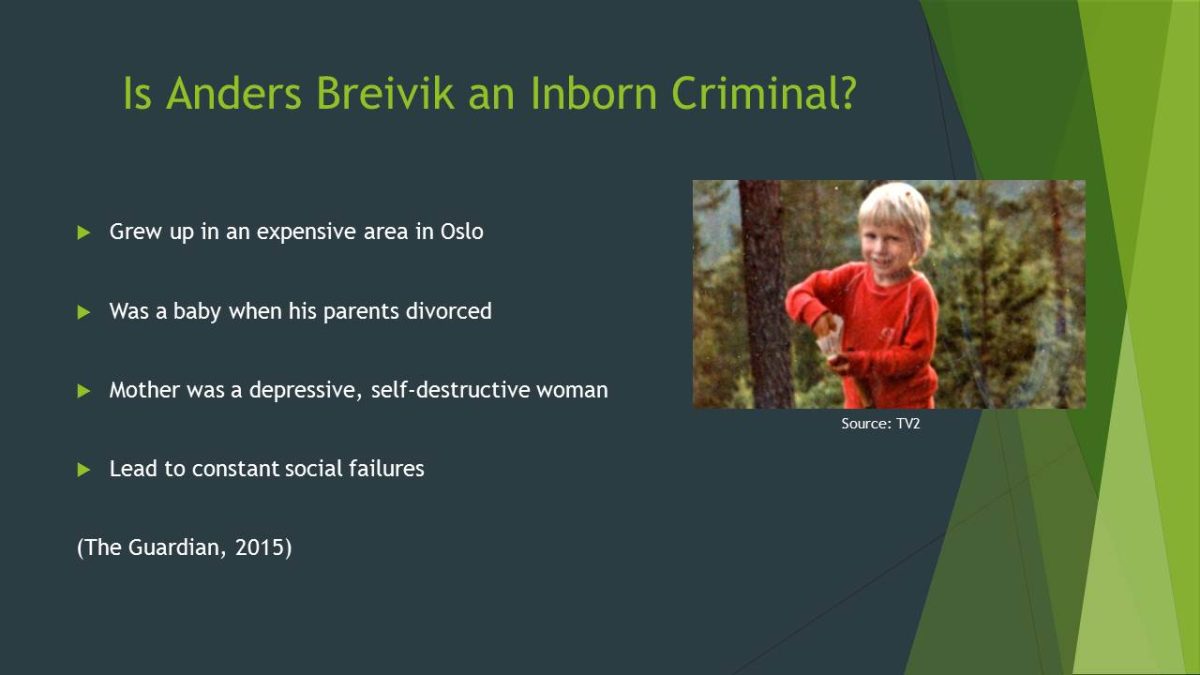
Charges
- Violation of 147 paragraph of Norwegian criminal law.
- Acts of terrorism:
- “destabilizing basic functions of society”.
- “creating serious fear in the population” (Rennison, 2011).
- Main issue – was he insane or sane?
- 2011 report – paranoid schizophrenia.
- 2012 report – Breivik is sane.
Speaker notes: On July 25, 2011, Breivik was charged with “destabilizing or destroying core operations of society” and “creating considerable fear in the people,” both of which are considered acts of terrorism under Norwegian law (Rennison, 2011). In December 2011, psychiatrists produced a study concluding that he was suffering from paranoid schizophrenia, bolstering the court’s potential insanity defense (Rennison, 2011). The court, however, after receiving widespread criticism from legal and medical experts, decided to appoint two new psychiatrists. Psychiatrists determined that Breivik was legally sane on April 10, 2012, allowing him to be sentenced to prison or confinement (BBC, 2012).
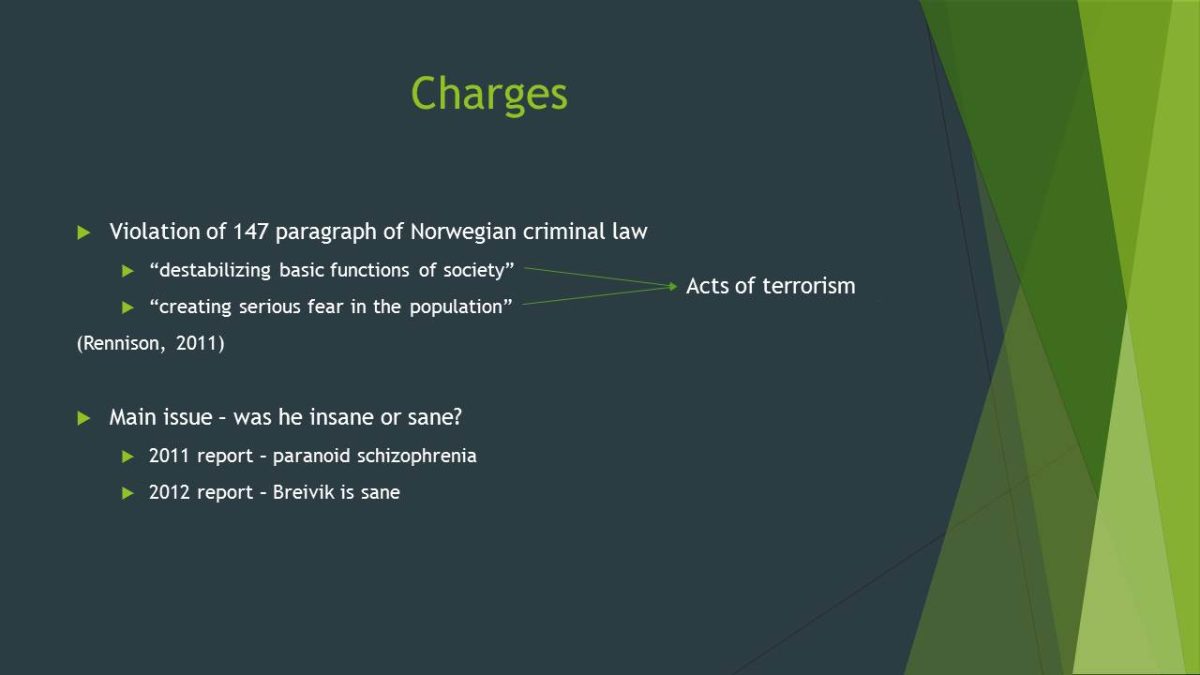
Conclusions
- The need to prevent the far-right and Islamophobic ideology.
- Breivik became an inspiration for the far-right radicals.
- Controversial ‘memory politics’.
- People become “bad” as a result of unfavorable conditions.
Speaker notes: As a result of the 2011 attacks, the Norwegian parliament ordered the Gjorv Report. On August 13, 2012, one year after the establishment of a fact-finding commission led by Alexandra Bech Gjorv. According to it, police could have prevented the bombing, arrived on Utoya Island sooner, and apprehended Anders Behring Breivik sooner, according to the report. It also came to the conclusion that Anders Breivik could have been prevented from carrying out the massacre in Utoya. Memory politics by the Norwegian government were also deemed as controversial. The government decided to tear down a landmark building in the centre of Oslo damaged by the bombing and a memorial planned near Utoya remains unfinished.
The question, however, is “are people born or are they influenced in order to become criminal and commit crimes. Within this case, we have seen that childhood traumas and hard teenage years proved to be decisive for Breivik’s future. He was not born bad, rather his experience shaped his morality and values, ending him on a criminal record. Indeed, he was a ‘needy’ child, but it is the environment in which he was growing that played the major role in his radicalization.
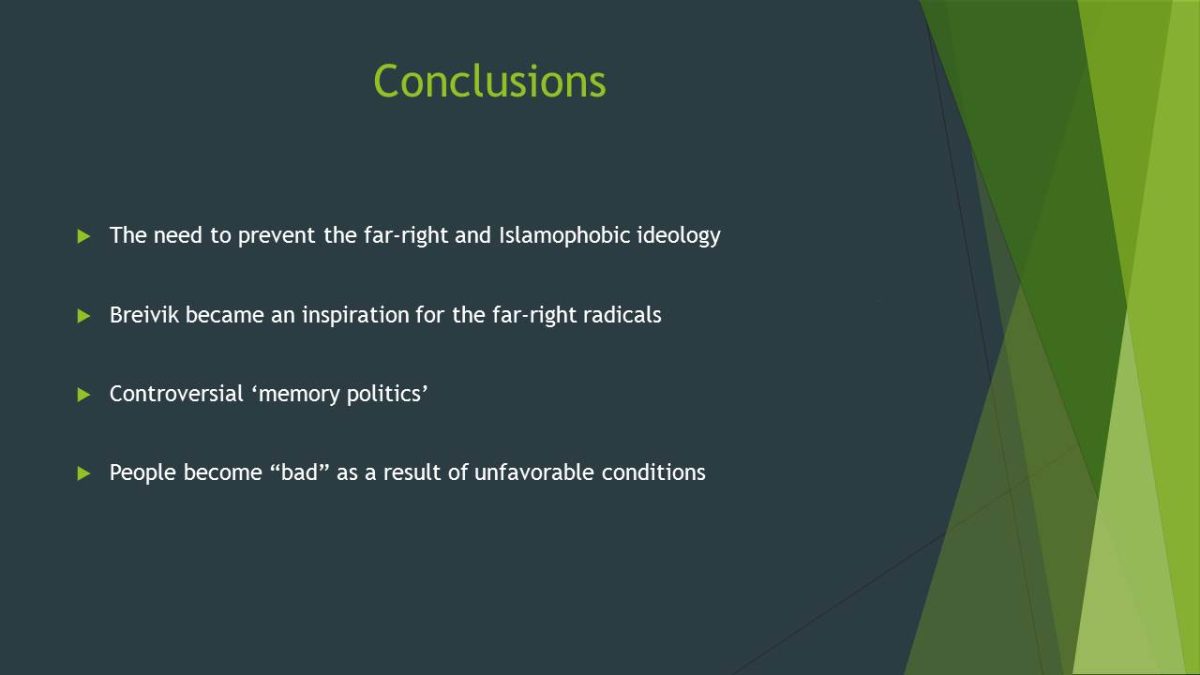
References
BBC News (2012). Anders Behring Breivik: The Norwegian court finds him sane.
Berglund, N. (2012). Krekar, ‘Fjordman’ called to testify. Norway’s News in English.
Breivik, A. (2011). 2083: A European Declaration of Independence. Self-Published.
Costello, B. J., & Laub, J. H. (2020). Social control theory: The legacy of Travis Hirschi’s causes of delinquency. Annual Review of Criminology, 3, 21-41.
Garnier, S., Caplan, J. M., & Kennedy, L. W. (2018). Predicting dynamical crime distribution from environmental and social influences. Frontiers in Applied Mathematics and Statistics, 4, 1-10.
Rennison, J. (2011). First Court Hearing for Anders Behring Breivik Held in Private. International Business Times.
Sirgiovanni, E. (2017). Criminal heredity: The influence of Cesare Lombroso’s concept of the “born criminal” on contemporary neurogenetics and its forensic applications. MedicinaNeiSecoli, 29(1), 165-188.
The Guardian (2015). One of Us: The Story of Anders Breivik and the Massacre in Norway by Asne Seierstad – review.
Van der Heide, L., Weggemans, D. (2013) The Anders Behring Breivik Trial: Performing Justice, Defending Democracy. International Centre for Counter-Terrorism.